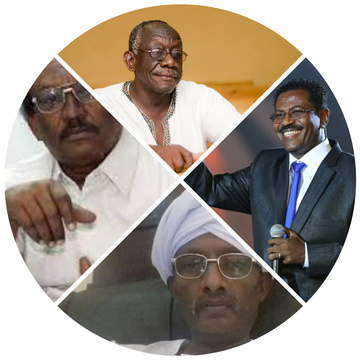Although it is recognized as a profession Singing in times of war: entertainment or livelihood?

*Magdy Al-Fadil Saeed: The singing and dancing practiced by Sudanese abroad is unprecedented.
*Dr. Anas Al-Aqib: Artists are facing difficult circumstances.
*Salah Brown: (The Gunat) are the reason for the attack
*Sunni: Does abstaining from parties confirm our patriotism?
Sudan Events: Magda Hassan
Despite the heavy singing production at this stage, any singer’s announcement of a concert has started to arouse people’s ire, and their attitude is to say, “What are people up to, and what are you?” People put singing in the category of entertainment, and by analogy, the comment comes, “This is not the time, our the country is at war.”
*Recognition of the profession
The Council for Musical and Acting Professions in Sudan came to regulate the singing scene and recognize singing as a profession. The singer carries the card of a professional who makes a living from this profession. Due to the outbreak of war in Sudan, this profession stopped or almost stopped, and its market began to become active in other capitals to which singers headed, and this caused a widespread wave of criticism on the singers. Magdy Al-Fadil Saeed commented in this context: The amount of dancing, parties, and hazing that the Sudanese practice now in the Gulf countries, Egypt, and Ethiopia, has historically not been witnessed in those countries by any other community, not even the Indians, the people of singing and dancing, and with this conversation, Magdy summarized everything that was being raised.
*A difficult situation
Singing at this time is important for singers within the framework of the profession from which they live, and this is what musician Dr. Anas Al-Aqib, pointing out that the failure of singers to sing is a specific negligence towards the country and towards their families: The singer needs work just like any other person, and if my children had not taken care of my expenses, I would have gone to sing in restaurants, but we will not beg for singing, so I do not blame those singers in Cairo for singing or even staying. Their situation is difficult for concerts, to the point that some of them do not have the money for transportation. Al-Aqib added, “Because someone who cannot eat cannot compose and compose.”
*Proof of patriotism
The artist Mustafa Al-Sunni had presented an eloquent plea in a previous interview with Al-Ahdath after the media launched an attack on him because of his participation in singing in concerts. Al-Sunni wondered whether his expulsion from his residence for not paying the rent because he stopped singing proves his patriotism!? He stressed that the singer, the musician, the blacksmith, and all those in the professions are equally concerned, each striving to live and provide the necessities of life. He said it frankly: Who asks us to hide and be ashamed? Haven’t you been looking for ways to provide youreslves with a living? Did you not seek to help your family, whether you were inside or outside Sudan? Did you abstain from eating, drinking, and sleeping to support them? We hope that you will place us in the rank of human beings who strive for themselves, their families, and life’s obligations.
*Sad experiences
The singer Salah Brown has a different opinion, as he believes that those who spread low-quality singing are the cause of criticism for all singers, as the experiences of them abroad are successful, taking into account that singing is like any other profession: It is clear what the state of Sudanese song has become and what the so-called Gunat and semi-Qunat constitute low-quality singing in the city of Cairo indicates the state the Sudanese song. He added: I say that what happened to the artistic field has happened to all other fields since the emergence of rural culture in an unequal mixing with the culture of the city, in which the singing of great artists such as the giants Mohamed Wardi and Mohamed was loud. Al-Amin, Othman Hussein, Abdulaziz Muhammad Daoud, Al-Kabli, and many others. In fact, when the descending songs of apostasy rise and the country is busy with matters that have nothing to do with progress and development, such boils appear. That saddens us, but despite this tragic picture of the musical situation, the great Sudan is still carrying in within it many wonderful works that express the originality of the Sudanese creator. For example, the beautiful and wonderful Professor Youssef Al-Mousli who filled the conscience with emotional and patriotic songs in a duet with the late creative Mustafa Sayed Ahmed, the poet Madani Al-Nakhli, and Professor Halawi in the Emirates, and Fadwa Farid, and Professor Rani Al-Samani and his daughter Sarah in Canada, the creative professor Tamador Sheikh Al-Din, Nancy Ajaj, Dardiri Daldoum Al-Qassas, Al-Wathiq Al-Amin, and Al-Habib Ali Al-Saqeed, and others in a great national operetta, including the handsome artist, Mr. Omar Hassas. All of these have been working since the beginning of the war until now in producing works to support the people of Sudan and draw the world’s attention to stopping it.
Although, getting out of this mire will only come in the context of the state of justice, freedom, and peace that we seek, so that the ranks will then be distinguished, so be patient, for the state of knowledge and progress will inevitably come.



